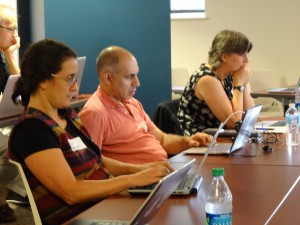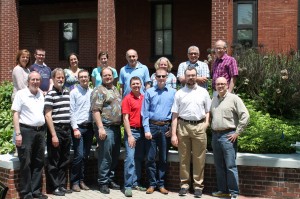(Guest post by Heidi Ellis Professor and Chair of the Computer Science and Information Technology department at Western New England University. She has a long-time interest in computing education and has been supporting student participation in open source software since 2006 and has been PI or Co-PI on three NSF-funded grants in this area. Heidi also writes about students and open source at http://heidiellis.wordpress.com/)
The end of May saw another successful group of faculty members come together in Philadelphia to explore how to involve students in humanitarian free and open source software (HFOSS) to support student learning. The POSSE workshop (stands for Professors Open Source Summer Experience) was originally created by Red Hat to be an immersive experience in open source tools and culture for faculty members. The idea is to provide instructors with the necessary understanding of FOSS for them to support student participation in FOSS projects in the classroom.
A group of faculty members (Darci Burdge and Lori Postner from Nassau Community College, Greg Hislop from Drexel University, myself and Stoney Jackson from Western New England University, Sean Goggins from University of Missouri, and John Sener from Sener Learning) obtained some NSF funding in 2012 to expand on POSSE. This expansion adds an online component for about a month before the face-to-face meeting as well as the organization of small groups to support the effort afterwards. The idea is to let instructors learn about the nuts and bolts of the tools before a face-to-face meeting during which they'll learn about the culture and how the tools are used in an actual project.
 The three-day meeting in Philadelphia kicked off on Wednesday May 28th with introductions. Most of the group had met on IRC prior to the meeting and the group quickly started forming a community. We had eight new faculty members, three former POSSE members, and seven tream members. In addition, Sara-Jayne Terp represented Ushahidi, Joanmarie Diggs spoke for the GNOME Accessibility Team and Bryan Behrenshausen came from Red Hat and has generated an opensource.com article on some of the learnings.
In addition to covering tools and the FOSS culture, the meeting covered aspects that are important for bringing HFOSS into the classroom. For instance, how do you select an ideal project for students to work on? What kinds of assignments can students do? How do you handle the unpredictability of an HFOSS project where the direction of the project may change mid-term? How do you align the classroom schedule with the HFOSS project schedule? How do you grade in the flexible environment of an HFOSS project? We also spent time getting started using HFOSS projects such as Ushahidi, OpenMRS, and some GNOME Accessibility projects. And of course we had lots of fun!
The three-day meeting in Philadelphia kicked off on Wednesday May 28th with introductions. Most of the group had met on IRC prior to the meeting and the group quickly started forming a community. We had eight new faculty members, three former POSSE members, and seven tream members. In addition, Sara-Jayne Terp represented Ushahidi, Joanmarie Diggs spoke for the GNOME Accessibility Team and Bryan Behrenshausen came from Red Hat and has generated an opensource.com article on some of the learnings.
In addition to covering tools and the FOSS culture, the meeting covered aspects that are important for bringing HFOSS into the classroom. For instance, how do you select an ideal project for students to work on? What kinds of assignments can students do? How do you handle the unpredictability of an HFOSS project where the direction of the project may change mid-term? How do you align the classroom schedule with the HFOSS project schedule? How do you grade in the flexible environment of an HFOSS project? We also spent time getting started using HFOSS projects such as Ushahidi, OpenMRS, and some GNOME Accessibility projects. And of course we had lots of fun!
 Kudos to the instructors who attended the POSSE. They were involved and interactive, asking the hard questions and contributing experiences. Groups around OpenMRS and GNOME Accessibility have already started meeting in small groups. I'm looking forward to seeing the plans that faculty have and the cool things students can do when involved in HFOSS!
Kudos to the instructors who attended the POSSE. They were involved and interactive, asking the hard questions and contributing experiences. Groups around OpenMRS and GNOME Accessibility have already started meeting in small groups. I'm looking forward to seeing the plans that faculty have and the cool things students can do when involved in HFOSS!